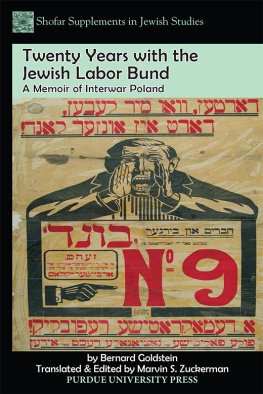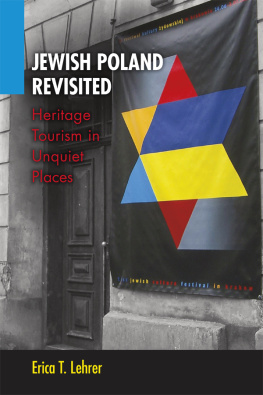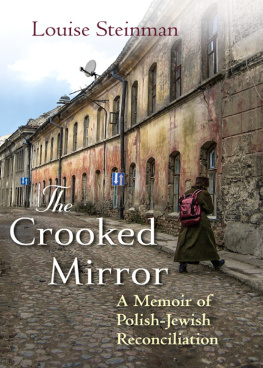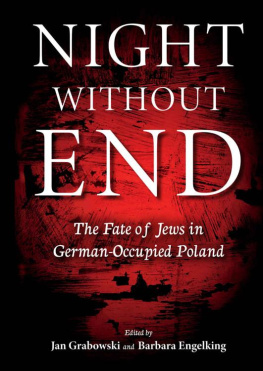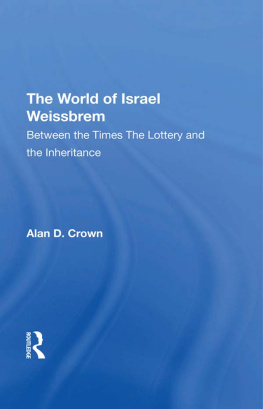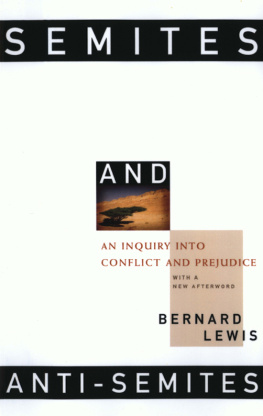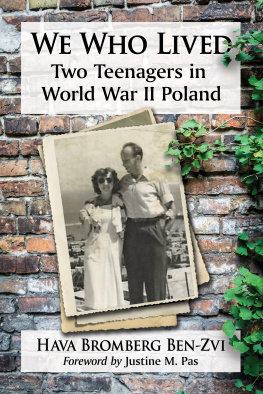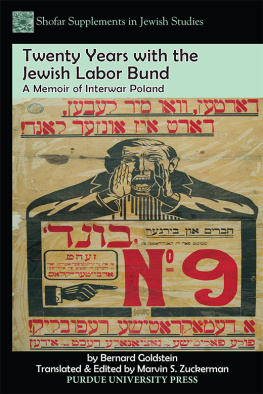
Twenty Years with the Jewish Labor Bund
A Memoir of Interwar Poland
Shofar Supplements in Jewish Studies
Zev Garber, Editor
Los Angeles Valley College
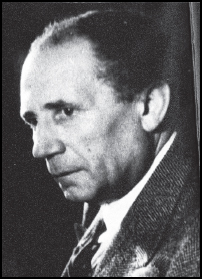
Bernard Goldstein (18891959). From the Archives of the YIVO Institute for Jewish Research, New York.
Twenty Years with the Jewish Labor Bund
A Memoir of Interwar Poland
Bernard Goldstein
Translated by Marvin S. Zuckerman
Preface by
Victor Gilinsky
Introduction by Emanuel Sherer,
General Secretary, Jewish Labor Bund
Purdue University Press
West Lafayette, Indiana
Copyright 2016 by Marvin Zuckerman. All rights reserved.
Printed in the United States of America.
Originally published in Yiddish by Unser Tsait, New York, 1960.
Library of Congress Cataloging-in-Publication Data
Names: Goldstein, Bernard, 1889- author.
Title: Twenty Years with the Jewish Labor Bund: A Memoir of Interwar Poland/by Bernard Goldstein; translated by Marvin S. Zuckerman; preface by Victor Gilinsky; introduction by Emanuel Sherer, PhD, General Secretary, Jewish Labor Bund.
Other titles: Tsvantsig yor in Varshever Bund. English.
Description: West Lafayette, Indiana: Purdue University Press, [2016] | 2016 | Series: Shofar Supplements in Jewish Studies | Includes bibliographical references and index.
Identifiers: LCCN 2015048692| ISBN 9781557537492 (pbk. : alk. paper) | ISBN 9781612494470 (epub) | ISBN 9781612494463 (epdf)
Subjects: LCSH: Oglny ydowski Zwizek Robotniczy Bund w Polsce. | JewsPolandWarsaw.
Classification: LCC HD8537.O42 G6513 2016 | DDC 305.892/4043841dc22
LC record available at http://lccn.loc.gov/2015048692
Cover image: Poster stating, There where we live, there is our country! A democratic republic! Full political and national rights for Jews! Ensure that the voice of the Jewish working class is heard at the constituent assembly! Kiev, ca. 1918. The poster further urges Jews to vote for the Bund candidates, Slate 9, in an election following the Russian Revolution, when non-Bolshevik parties were still being tolerated by the Communist regime. From the Archives of the YIVO Institute for Jewish Research, New York.
This volume is gratefully dedicated to
Leo Melamed
in appreciation of his generous contribution to this project
and
to his beloved parents
Faygl and Itzchok Melamdovitch
ardent Bialystok Bundists, both.
I have always regarded memoirs as source material.
A memoir provides a record not so much of the memoirist as of the
memoirists world.
Arthur Golden
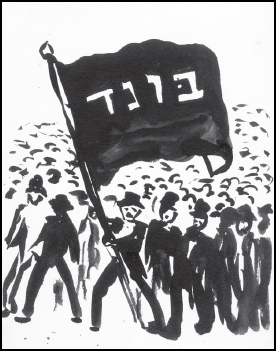
Figure 2. The flag reads BUND. Artist unknown. From the translators private collection.
Contents
Some memoirs transcend their detailed recollections of an individuals experience to illuminate a time past in a way that historical accounts cannot do. That is what Bernard Goldsteins memoir does for the Jewish world in Poland between the world wars.
The Jewish community in Poland was at the time the largest single concentration of Jews in the world, the heartland of the East European Yiddish-speaking cultural world. It was also the capital of the Jewish Socialist labor movement, the most popular Jewish movementmore so than Zionismon the eve of World War II. It produced remarkably energetic and creative people, some of whom came to the United States and played key roles in the American labor movement and in the Democratic Party.
All this was of course utterly destroyed by Hitlers Germany. In the end, Zionism prevailed, led by early emigrants from the Jewish community in Poland. But in their struggle to create a new nation in Palestine their public narrative emphasized the bravery of Israels defenders in contrast with the defenseless Jews who perished in the Holocaust. The reality of the vibrant, rough and tumble pre-World War II Jewish world in Poland has been submerged by the subsequent Holocaust literature and the subsequent focus on Israel.
The picture Bernard Goldstein paints of Jewish life in Poland before World War II is a very different one from the widely held caricature of timorous Jews. It was a time of struggle but also of optimism, greater assertiveness, and self-confidence. It is important to bring that earlier period back to life to balance the historical account. Jewish readers with roots in Eastern Europe will find much here to be proud of.
Between the wars, Goldstein was head of the Militia of the Bund, as the Jewish Social-Democratic Labor Party was called. He provides an unparalleled street-level view of the political struggles for the Jewish masses in Poland, then emerging into the secular modern world, and the fights to organize the Jewish workers. Goldstein and his tough operatives got involved with a broad cross-section of the Jewish and Polish societies, including their seamy sides, all of which he writes about with a keen eye. His sketches of the Jewish underworld in Warsaw recall Isaac Babels descriptions of the Jewish criminal world in Odessa.
Comrade Bernard, as he was known, organized street demonstrations and protests. Against great odds he gained union rights for Jewish workers such as the slaughterers, bakers, and teamsters, and battled for higher pay and better working conditions. He knew the workers well, as he was the one they went to with their complaints and even their personal problems. Throughout, and in line with his partys directives, he maintained and taught a high ethical standard of behavior.
Goldsteins book consists of a series of short anecdotal chapters based on what he personally witnessed and played a part infighting off an armed attack by the Jewish Communists; defending a street demonstration; attending a gangster wedding; repulsing Polish hooligans attacking Jews in Warsaws park; protecting a prostitute from her pimp so she could get off the street and marry; making peace between knife-wielding Jewish and Polish butchers; and joining Jewish Socialist youths at their summer camp right before the war, little imagining that these young people would then come to lead the heroic and tragic Warsaw Ghetto Uprising in 1943. Goldstein himself later fought in the Warsaw Ghetto and survived.
Victor Gilinsky
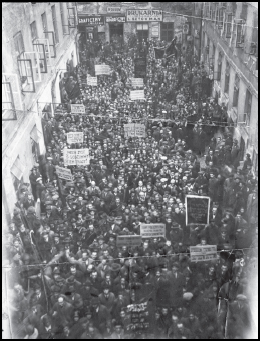
Figure 4. A pre-World War II Bund Rally in a Warsaw Courtyard.
In October 1897, under cover of the Jewish high holy days, in the attic of a small, rundown house on the outskirts of Vilnius, thirteen Jewish intellectuals, writers, and workingmen gathered together, illegally, from five different cities of the Pale, to form what they decided to call Der Algemeyner Yidisher Arbeter Bund fun Rusland un Poyln (The General Jewish Labor Bund of Russia and Poland)which came to be known by the one wordBUND.
The organization which they formed came to play a large role in East European Jewish life for the next close to 50 years, until it was destroyed by the two great destroyers of our time: Hitler and Stalin, Nazism and communism.

